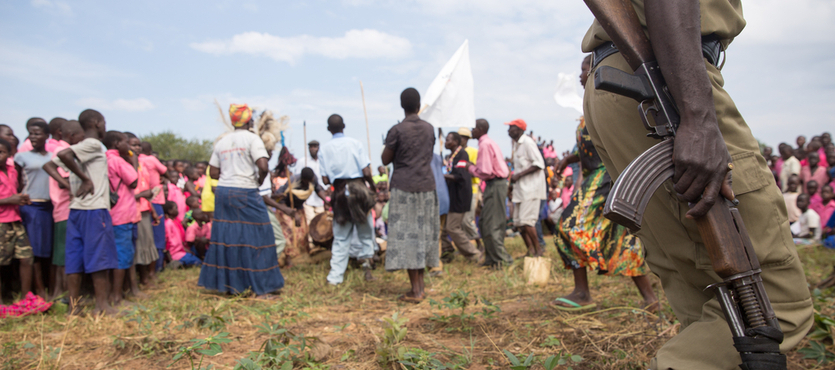Russian mercenaries are reportedly already boots-on-the-ground in the Central African Republic. Can American contractors be far behind?
According to sources, Russian mercenary Yevgeny Prigozhin agreed to help embattled CAR President Faustin-Archange Touadera assert greater control over the country. This assistance included not only mercenaries, but also Valery Zakahrov. The CAR’s national security advisor is supposedly a Russian intelligence agent. Meanwhile, the United States is deeply interested in this country. Its plentiful natural resources make it a tempting target for rogue nations. Furthermore, the CAR has a strategic location. It is almost exactly between Africa’s largely Muslim north and largely Christian south.
Russian mercenaries have used the CAR as a base for other operations, most notably an attempt to destabilize Madagascar’s recent presidential election.
Five Potential Hotspots in Africa
In the late 1800s, as the United States was busy dealing with internal divisions, most European countries were busy carving up what was then known as the Dark Continent because Europeans did not know much about Africa, but they knew there was money to be made by its subjugation.
So, in less than 35 years, Africa changed completely. In 1880, there were only a few small European colonial outposts amidst a sea of independent countries, many of which had thrived for generations. By 1913, ancient Ethiopia and tiny Liberia (which was essentially an American protectorate) were the only two independent African nations left. Every other square inch was a European colony.
Now, roughly 200 years later, there may be another Scramble for Africa. This time, it will be a scramble for influence instead of outright power.
In terms of its natural resources, the landlocked Central African Republic is one of the richest countries in the world. But in terms of the people’s income, this former French colony is one of the poorest places in the world. Since the CAR’s independence in the 1960s, that disparity has spawned political instability. An ongoing civil war has almost literally split the country in two, as rebel groups created the quasi-independent Republic of Logone, or Dar El Kuti, in December 2015.
In the mid-1850s, France saw a chance to exploit this area. Arguably, Putin’s Russia has basically the same intentions. So, the conflict and killing in the CAR could drag on and on. American contractors often come to places like these to provide overall stability and security for American citizens.
The nearby Democratic Republic of the Congo is the largest former French colony in Africa and the 16th largest country in the world. The DRC is a place of great wealth and great violence. Many valuable minerals, such as coal, iron, gold, and diamonds, are plentiful here. But ongoing tribal violence may have killed as many as five million during decades of conflict. Famine and disease killed most of these people. Additionally, there was a severe Ebola outbreak shortly before the December 2018 Presidential election, which the government may have used as an excuse to rig the election.
So far, there has been little non-French foreign intervention in the DRC. But many observers believe that situation could change, especially if the political instability worsens.
Libya was one of the centers of change in the 2011 Arab Spring. After several months of fighting, which included a NATO-enforced no-fly zone to protect civilians, rebels ousted longtime strongman Muammar Qaddafi. As is often the case in these situations, after this authoritarian dictator left, the region plunged into civil war.
Political violence lead to international intervention in 2011, and the same thing may happen again. Libya has the 10th largest petroleum reserve in the world, and a strategic location, as well.
With nearly 190 million inhabitants, Nigeria is the largest country in Africa. A third of these people are under 18. Moreover, all these people come from over 250 ethnic groups. The situation is unstable. Boko Haram, a violent offshoot of ISIS, is active here, especially in the northern part of the country.
After fighting anti-insurgency campaigns in places like Afghanistan and Iraq, many American military contractors have sought-after skill sets in places like Nigeria. It is only a matter of time before the United States calls on these firms to bolster its interests in this oil-rich country.
Ancient Algeria is the world’s largest Arab country. This sprawling country has the 16th largest oil reserves in the world, and more importantly for Europe, the ninth largest natural gas reserves in the world. Politically, things seemed to be improving in Algeria. The government lifted a decades-long state of emergency declaration in 2011 and promised continued political and economic reforms.
Algeria is also fighting a war with its neighbor. If the Algeria-Mali conflict escalates, the Department of State could summon American contractors to protect its installations in this notorious anti-American country.
Injury Compensation Available
When contractors are seriously injured in places like these, they can turn to the Defense Base Act for injury compensation. DBA protection usually applies to any injured contractors who:
- Work for a United States government agency
- In an overseas war zone.
This protection applies to all overseas contractors, whether they carry guns or not. In fact, most American contractors are noncombatants. They are mechanics, drill instructors, military support workers, like chefs, and construction workers.
Additionally, a “war zone” is not just a place where bullets are flying. Any country with any U.S. military presence is a war zone for DBA purposes. Moreover, victims need not be injured while they were on duty at their assigned post. Any in-country injury which has some relationship to a military purposes may qualify for compensation.
Typically, this compensation includes money for lost wages and medical expenses. Most victims receive two-thirds of their Average Weekly Wage for the duration of their temporary disability. The medical payment benefit includes not only hospital bills but also physical therapy costs and other reasonably necessary medical expenses.
For more information about the types of injuries the DBA applies to, contact Barnett, Lerner, Karsen, Frankel & Castro, P.A.

